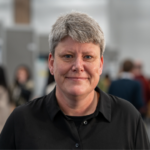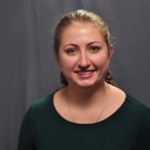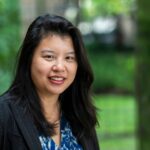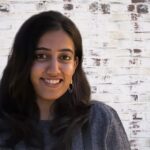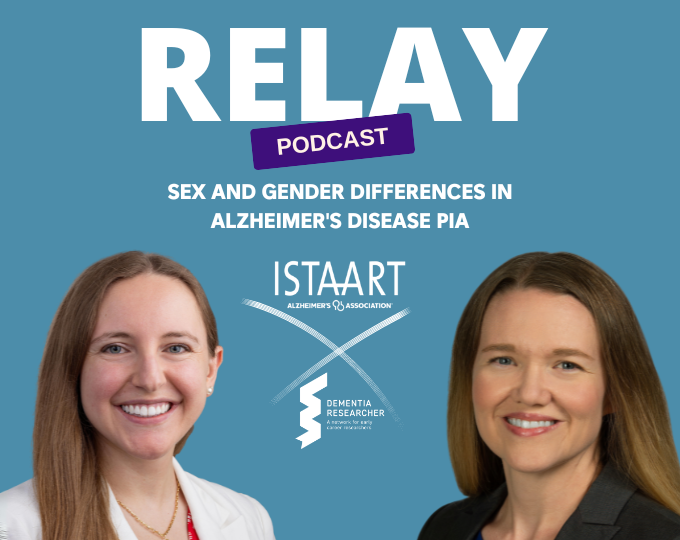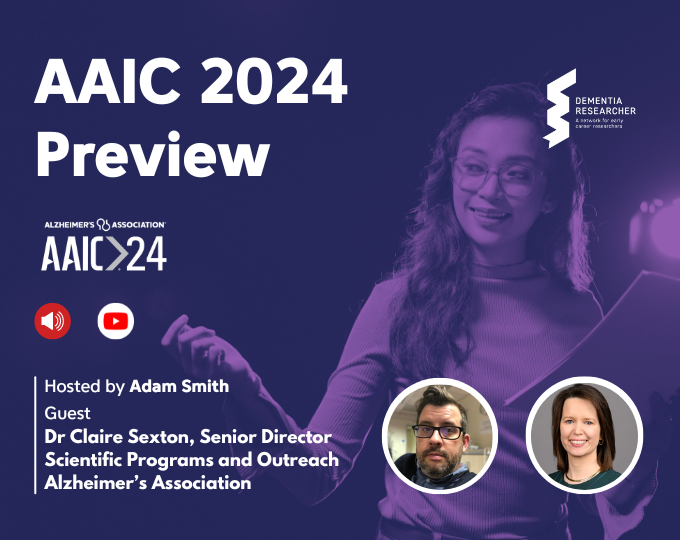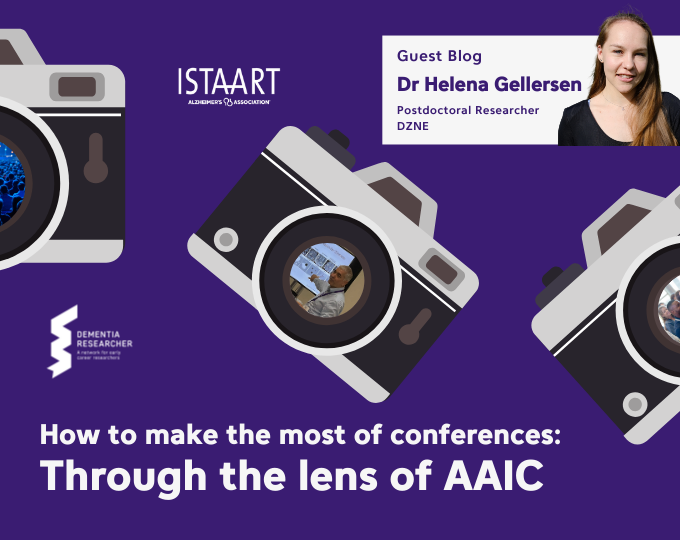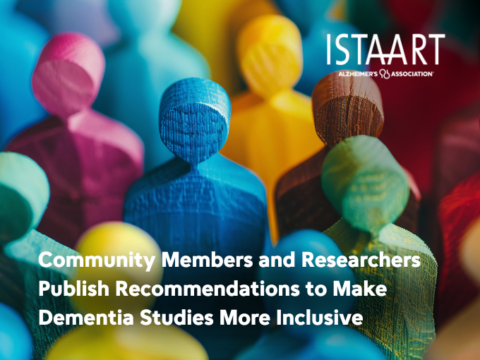In this podcast we share a few selected highlights from the fourth day of the Alzheimer’s Association International Conference (AAIC) taking place in Philadelphia and Online, 28th July to 1st August.
Dr Amanda Heslegrave, Principle Research Fellow at University College London, hosts the show with special guests:
- Dr Darina Petrovsky, Assistant Professor at Duke University
- Dr Emily Ho, Assistant Professor at Northwestern University
- Meenakshi Menon, ISTAART Ambassador and incoming PhD student in Cognitive Sciences at Georgia State University
The AAIC brings together distinguished basic scientists, clinical researchers, early career investigators, clinicians and the care research community at the largest and most influential international conference on dementia science. They share theories and breakthroughs while exploring opportunities to accelerate work and elevate careers.
Main plenary talks from the day included Tara Spires-Jones presenting on 'Synaptic Oligomeric Tau In Alzheimer’s Disease — A Potential Culprit In The Spread Of Tau Pathology Through The Brain ', Ricardo F. Allegri on 'Dementia Research In Low- And Middle-Income Countries: Initiatives That Seize Opportunities, Overcome Challenges And Build Capacity'.
Dr Amanda Heslegrave:
Hi, and welcome to the third Dementia Researcher, AAIC highlights programme coming to you from Philadelphia. Now I'm Dr. Amanda Heslegrave, and it's great to be back hosting one of these great shows. As regular listeners will know, we come to this massive event every year to share some of the best bits. With over 5,000 talks and posters, it's hard to even scratch the surface of what had been covered. However, to give you a snapshot of the talks from Wednesday, I am joined by Emily, Darina, and Meena.
Dr Darina Petrovsky:
Hi, everyone.
Dr Amanda Heslegrave:
Thank you so much for taking the time out to join me. So, first of all, I'm going to introduce myself. I'm Amanda and I'm a principal research fellow at the UCL and I lead the UK Dementia Research Institute Biomarker Factory. And it's been a really busy week for me because biomarkers and blood tests for dementia have really been a kind of highlight of this conference as they have actually for the last few years. So that's me. And now I'm going to let my guests introduce themselves and also hear about what they've been presenting this week. So, Emily, why don't you go first?
Dr Emily Ho:
Thanks. Hi, my name is Emily Ho. I'm an assistant professor at Northwestern University at the medical school, and that's based in downtown Chicago, right next to Lake Michigan. My training is in the behavioural sciences and measure development, and I work a lot on developing the tools to basically help us detect early cognitive decline. So, I lead the assessments for NIH toolbox, and I'm also really interested in other predictors of early cognitive decline like olfaction and more recently decision-making and mild behavioural impairment. And I just presented a poster on decision-making measures that are in the literature and hosted a ISTAART Intermission on decision-making and ageing that was sponsored by the subjective cognitive decline, PIA. So maybe we can talk about that later, but for now, I'll turn it over.
Dr Amanda Heslegrave:
Okay. Thanks very much. And then Darina, your turn.
Dr Darina Petrovsky:
Sure. My name is Dr. Darina Petrovsky. I am similar to you an assistant professor, but at Duke University, North Carolina in the United States. I'm a nurse scientist and a musician so my programme of research looks at the impact of music-based interventions for older adults living with dementia and their caregivers. I conduct clinical trials and I also do look at the protective effect of arts involvement over time on cognition and other outcomes in this population.
At this year's conference, I presented one poster looking some of my ongoing work in the development of music-based app for older adults living in dementia, specifically targeting on sleep. And I mostly, my other involvement has been with the PEERs PIA that focuses on development and career advancement of early career scientists. I led two workshops, one on writing and publication, and the second one on project management skills. And both sessions were fully attended. We had to unfortunately turn some people away, but all the intermissions as well as the lunchtime workshops were a great way for early career scientists to get involved and learn more about AIC.
Dr Amanda Heslegrave:
Well, that's great that you're helping the ECR side of things. I think that's really, really important and something that this conference seems to me to do really well, actually. They have lots of stuff for the younger scientists, the emerging scientists, so that's great. Okay, Meena, I can see you must have been busy being an ambassador this week, but perhaps you want to tell us a little bit more about yourself.
Meenakshi Menon:
Yeah. Hi, I'm Meenakshi Menon. I'm from India, so I'm an incoming PSG student at Georgia State University in Atlanta. So, I start classes next month. My backgrounds in psychology and I'm going to be working on cognitive ageing, particularly looking at stereotype threat and its influence on cognitive testing in older adults. And yeah, I'm really looking forward to the PhD, but being here at AAIC during this interjunction in life has been amazing in terms of building my PhD goals also in terms of connecting with professionals in the field. I've had a lot of great opportunities.
I used to work at the Centre for Brain Research within the Indian Institute of Science in Bangalore, India. And I presented work I did at CBR, the Centre for Brain Research. It was a poster on language and cognitive control, which is a field that I am greatly interested in. And aside from that, the ISTAART ambassador duties have been great fun. I've had an opportunity to interact with ambassadors, early career researchers from across the world. There's been a lot of great round opportunities around the year as well for training and, yeah, career growth. So yeah, altogether it's been a great experience so far.
Dr Amanda Heslegrave:
Thank you. That's really interesting. So, I think now probably we can get on with the podcast. If anyone is new to this podcast, I'll explain what happens and what the format is. Basically, we go around the room three or four times, depending on how much time we've got, and ask the guests to talk about the best bits, the best talks they've been, and the take-home messages that they've got from them, and tell us who they were by and why you enjoyed them and kind of like a little summary. So, can I first come to you, Emily?
Dr Emily Ho:
It's so hard to choose one because there are so many amazing talks and poster sessions as always. So, one that particularly stood out to me was recently I think we've realised that it's not just about detecting cognitive decline, but it's detecting things like maybe motor dysfunction and there's other kinds of indicators and other ways of maybe improving on those kinds of functional activities of daily living. So, there was one intervention that I really liked was an olfactory one, and it was called Mind Your Nose. And it was presented at one of the featured research sessions yesterday afternoon by Isabelle Burke, who's a trainee. And this is work with Ben Hamstead at U Michigan and Alex Bahar-Fuchs at Deacon University in Australia.
And essentially this intervention had people who had subjective cognitive decline, essentially learn like an olfactory, they called them olfactory training. So over, I believe it was 20 days, they kind of had to just learn the sense and associate them with the stimuli. And what was really interesting is that then they looked at this effect of this training on visual-spatial performance and visual-spatial memory, and they found a really nice modest but significant effect that improvements on the olfaction training also helped with visual-spatial memory. And I thought it was very nicely done and really impactful and very clean experimental design that was really-
Dr Amanda Heslegrave:
And this is my fault, but is this humans or mouse?
Dr Emily Ho:
Oh, humans.
Dr Amanda Heslegrave:
Okay, sorry.
Dr Emily Ho:
Humans. I should have specified, older adults.
Dr Amanda Heslegrave:
No, maybe I wasn't listening that good.
Dr Emily Ho:
Older adults. Yeah.
Dr Amanda Heslegrave:
Wow.
Dr Emily Ho:
Older adults that I believe had exhibited some or experienced some subjective cognitive decline.
Dr Amanda Heslegrave:
Okay. Sounds fascinating.
Dr Darina Petrovsky:
That's interesting you mentioned that because there was, at the PIA Day, I don't know if you got to go to that, but there was a pre-conference workshop focused on sensory health, and I went to it in hopes to get understanding of how to-
Dr Emily Ho:
That's a new one, is it?
Dr Darina Petrovsky:
Yep, that's a brand-new PIA, I think that just formed. And at that workshop they talked about the different senses. And what I wanted to get out of that session was I wanted to figure out how to screen for hearing impairment in the community, because obviously, that's a necessary skill for hearing music. But at that session, they talked a lot about olfaction, and I learned so much about how it's actually in some studies as a stronger predictor of cognitive decline as opposed to hearing and maybe vision. And we got to test out the different tubes and test ourselves of how well we can recognise the different smells. It was fascinating.
Dr Amanda Heslegrave:
Was there anything in it about difference between the sexes with respect to that? Because just on the N-of-1, me and my husband, I can smell things that he can't and hear things that he can't or he's just a man, I'm not sure.
Dr Darina Petrovsky:
I think someone asked that question, but I honestly don't remember what they said. But I'm sure the answer is-
Dr Emily Ho:
I think there are some differences.
Dr Darina Petrovsky:
Depends.
Dr Emily Ho:
Yeah. Briefly, in a paper I published last year, we looked at odour identification and basically, it's able to distinct the task, is able to discriminate between normal and amnestic MCIs and ADs, and that those with positive biomarker signals have worse performance on olfaction. So that's really interesting. And again, I think it's-
Dr Amanda Heslegrave:
A bit worrying.
Dr Emily Ho:
More and a little... maybe for [inaudible 00:10:25].
Dr Amanda Heslegrave:
Don't tell him.
Dr Emily Ho:
But in general, I think across the last couple of days, we've seen a lot more focus on sensory health and olfaction. And so really cool.
Dr Darina Petrovsky:
Outside of my comfort zone, but I definitely learned a lot. It was great.
Dr Amanda Heslegrave:
Okay. Did you want to add any more highlights?
Dr Darina Petrovsky:
Oh. Yeah, sorry. That was not one of the highlights. It came in, but I think it tied nicely what you were talking about. I think there were a couple of... there was one, I think plenary session, I believe that talked about the different languages. And the presenter I believe was from India. So that is a session I attend. At every conference, I tend to go to sessions that are way outside of my scope. And that one particular session focused on multilinguist, right, an ability to speak multiple language.
So what I took away from that is sort of how underdeveloped our measures in terms of assessing cognition and how there are now a lot more researchers from other countries who are thinking about how to adapt existing measures into their own either language, using pictures that are culturally appropriate, and to think about, okay, well it's not just... there's sort of a degree, a spectrum of how fluent you are in a language, which totally makes sense, but I don't think I quite think about it as much when I do work other folks.
So, there are some that would be more comfortable doing it in English as opposed to those maybe who will do it in Mandarin and maybe those maybe grew up in the US but maybe still feel more comfortable doing it in Mandarin. And so that really, I think, broadened my horizons and thinking about, wow, there's a whole world out there with so many languages and cultures and here in the US we really need to think about it broadly as well. So that was a fantastic session. Really learned a lot.
Dr Amanda Heslegrave:
And you've made me think that one of the things in the UK that we're really keen on doing is making it a much more trial-ready country because we don't get people recruited into trials in the UK as much as we should. And one of the things we want is not the sterile white middle-class population that we see in trials. We want everybody, we want the whole communities. So, we're going to have to think, aren't we about how we recruit those people and the cognitive tests we use for the different populations. And so that's really, really good and really important point, I think.
Dr Darina Petrovsky:
Very cool.
Meenakshi Menon:
Yeah, I wanted to add to that. So, the plenary by Dr. Suvarna Alladi that you're referring to.
Dr Darina Petrovsky:
Thank you.
Meenakshi Menon:
So, she spoke about the ACE, which is the Addenbrooke's Cognitive Examination, which has been adapted to several Indian languages. And I was fortunate to get the opportunity to administer ACE to participants in India. So as part of her longitude-
Dr Darina Petrovsky:
This was not planned by the way.
Meenakshi Menon:
Yeah. So, I was part of the TATA Longitudinal Study of Ageing, which is a long-term cohort study looking at the risk and protective factors of AD in the urban Indian population in Bangalore. And we used the Canada version of... Canada is a local language there. So we used the Canada version of ACE III which was really interesting because the pictures that she showed, we had the same pictures and to sort of compare it with the Western, the original version of it was really interesting because the work that Dr. Alladi and her team have done at NIMHANS is amazing because participants feel so much more comfortable answering and having this test in there in a language they understand and know is amazing.
And yeah, I think having heard that talk here, it was really nice because I saw a lot of people in the audience, we exposed see this series for the very first time. And, yeah, something else, another talk that I attended yesterday, it was called Dialogues of the Brain. It was also on multilingualism and cognition, and they looked at socioeconomic status and language and cognition.
So, looking at the intersection of SES and number of languages a person knows was also interesting because you would assume that multilinguals perform better than monolinguals in any context from the talk and from everything we've seen and read. But yesterday's session, the speaker mentioned that, so she found that monolinguals from high socioeconomic status performed much better than a multilingual from a low socioeconomic status.
So, the importance of studying SES also when you're studying this is also of great importance. So that I thought was interesting because back home, that's not something we really look into as much, and that was an interesting observation for me.
Dr Darina Petrovsky:
Cool.
Dr Amanda Heslegrave:
Okay. Thank you very much. I think that something that I was really interested to go to today was the session on AD and exercise because I like exercise and I'd like to hope that actually that's going to help and prevent AD. But it was quite mixed for me in terms... well, things I took away from it, there was Cindy Barker did a talk, she's from the University of Calgary, and she was talking about different aerobic exercise and resistance exercise and which ones increase neural neurogenesis. Well, I think there's mixed results in this, but also mix between sexes as well, which muddies it even further.
But also, that there's lots of experiments are done in rodents for this because, well, obviously we do lots of ad research in rodents, but how translatable is that to humans? And when they say that a rodent is free running of its own free will, I wonder if you can... you can't ask them if they want to go for that run, can you? So that was one thing, but another interesting thing...
And I think that I thought I'd go, and it would all be sorted out, right? They'd say, right, yes, you need to do this, this, and this, and you'll be fine. But no, it's all kind of still lots of research into what kind of exercise is best, but for which person, depending on your sex, depending on your age, depending on your body composition, there's lots of factors. So, it's not simple, I suppose, is what I'm saying. But still, that was interesting to listen to.
And I think, yeah, one of the things that really struck me, which kind of chimes with what we do in blood, or any kind of biomarkers is everything has to be standardised. All of the studies that you see, they have their own way of doing things and they get results that are contradictory, but because they're not all doing things the same way. And so, the lesson that I learned from that is, well, same old, same old I've put there, but you need to standardise your methods and you need to make it comparable. But anyway, it was an interesting session to go to, but I came away like lots of sessions I guess, thinking, oh yeah, need to do a bit more work there.
Dr Emily Ho:
Yeah, that makes me think a lot about implementation challenges and the sort of growing field of implementation science where it's not just enough to tell people, okay, exercise 30 minutes a day, it's not enough just to tell people eat less red meat. There's a gap in certain interventions between the sort of, I guess ideal way it's delivered and then how it's actually delivered. Like, the nurse practitioner's too busy to give you the handout and things like that. And so should I-
Dr Amanda Heslegrave:
Please, please carry on.
Dr Emily Ho:
One of the other talks that I went to that sort of gets at this kind of but a success story, so it's by Linda Lee, and she's in Canada, and basically, they've been working on this thing called Mint, which is the Multi-specialty Interprofessional Team. And the idea is to build dementia capacity in primary care settings. And essentially, it's a programme that, as I understand it, teams together different healthcare providers from nurses and doctors and other kind of social workers, I think, and to try to basically get patients screened quicker, referred quicker, and get their assessment. Just about building dementia capacity in these sorts of routine clinical settings.
So, they've been, I think at this for a while. I think I saw some of their work earlier in earlier AICs, but this time what they did was they expanded what worked, their kind of intervention, and they did it across three different provinces in three different healthcare systems. And they basically found that people got screened faster and they did some qualitative interviewing where they basically were looking at the barriers and the successes. And I think some of the successes to get something like this working in different settings is you have to have the support of the whole system. You have to have really engaged champions, you have to have people who really believe in this work and just kind of have them... yeah, it's not just enough to just kind of parachute in an intervention and just expect it to replicate exactly.
But I think they've been doing a lot of on-the-groundwork to kind of ensure that this happens. And yeah, I think that usually you kind of hear a lot of stories like what you just described, but I think in this case it was a relative success. So that was very cool. That was in the sort of long-term care, dementia session, yeah. Mm-hmm. Yeah, health services.
Dr Amanda Heslegrave:
Wonderful. Darina, another highlight perhaps.
Dr Darina Petrovsky:
Oh gosh, I think there are several. I think there is two that I think are related to. So, there was a featured research session yesterday that had a presenter from Australia from University of Melbourne, Dr. Felicity Baker, who presented on a large international randomised clinical trial called HOMESIDE that had care partner delivered music interventions. And I was just astounded. In non-pharmacological world, we don't tend to see really large sample sizes. It's really hard to do, it's to recruit. And the fact that she was able to do so involving I think four or five countries is amazing.
So, I had a chance to catch up with her after and learn a little bit about how she's done it. And there's one more session if I may, that was actually led by folks from the Alzheimer's Association, Dr. Sam Fazio, Dr. Lauren Stratton, and they talked about and presented the person-centred framework that Alzheimer's Association through LINC-AD has sponsored. And they presented on a measure that you can use to gauge how person-centred your measure is, which I had no idea about.
And so, I looked it up and that really sparked my ideas in terms of if I do instrument development, I can use that tool to help me gauge of how person-centred my measure is. So that was just a really great immediate task that I had written down that really applies to my own research.
Dr Amanda Heslegrave:
Okay, wonderful. Meena, do you...
Meenakshi Menon:
Yeah, I think aside from obviously all the sessions and the talks, I also want to talk about a few of the opportunities that I've had to build skills during the conference. So, I was part of a few of the workshops, the ISTAART workshops, and Intermissions the last couple of days, and I want to talk about one particularly. So, there's a workshop on grant writing... yes, yeah, I think it was yesterday. And we had people from the NIH and NIA come in and talk about how to write a successful grant. And as someone who's starting their PSG journey and is eventually going to hopefully be in academia even later on, I thought it was really great to have that space to speak to people who are on the other side reading these grants.
They gave us actionables. There were a lot of examples sent across in terms of how to write. It was a very interactive space as well. So that was a good learning experience for a lot of us just starting out. Aside from that, this conference has also been a great space to learn from those who've had such incredible careers. So as part of the Aware PIA networking events, and for one of the breakfasts, I sat in the same table as Dr. Goldie Byrd, who's the lifetime achievement awardee in Alzheimer's disease research.
Yeah, she was the mentor at the table and just listening to her journey in the field. She's someone who's worked closely with the African American community and just listening in on her experiences and what she had to say for someone just starting out, that was so inspiring. I think that at that table, we were all a lot of young researchers just starting out. So having her there and such a warm, wonderful person so that was really nice seeing that, listening to her, and getting that opportunity. Yeah.
For my PhD, I do want to work on cognitive ageing, particularly with communities who are underrepresented, like ethnic minorities and immigrants. So, Dr. Goldie Byrd, she works closely with the African American community. So, I had an opportunity to ask her questions around recruitment, retaining participants, testing in this community, also in terms of some research questions that I could explore in my PhD as well. So that was a great space for me to get ideas on how to use this in my PhD, how to go forward in that sense. So yeah.
Dr Amanda Heslegrave:
Okay. That's all very useful and just shows what you can get out of a conference like this apart from the research talks that people give you. Did anyone, I wonder see the plenary lectures today? Because there was another prize winner there who is actually, I think a great mentor and very inspiring, Tara Spires-Jones, who does the work on tau propagation. I actually feel like maybe it's out of your remit, isn't it? Yeah, so she looks at tau and how tau affects synapses. And the best bit of, and probably I was distracted for everything else after this, the best bit was she showed a video of them actually kind of taking a small part of a human brain and freezing... not freezing, I don't know what they do, they solidify it onto this piece of metal or something and then chop it all up and then stain it.
And it was just amazing because you can see the pre- and post-synaptic tau if they stain it with various different antibodies. And the prize that she won was the Carlick Iqbal... I think it's the Carlick Iqbal prize for the best paper in the last two years. So, obviously, it was massive work and there was also in, it was electron microscopy, which always fascinates me that you can actually see a synapse and the granules as well on both sides. It's like, wow. How?
But yeah, so that was a really exciting talk, and obviously someone at the absolute pinnacle of their career I guess you would say. But that was really interesting. And there was another one there, which might... did anyone go to the plenaries today? That's what I'm trying to get at.
No, the next speaker was Dr. Ricardo Allegri and he's from Argentina. And basically, the talk was kind of highlighting the discrepancies in research. And he was saying that if you're 60 to 70 years old, you're two to three times more likely to have dementia in Argentina than you are in a high-income country. And basically, most of this appears to be the fact that if you're from somewhere like Argentina, there's 60% of your risk is modifiable as opposed to something like 40 in high-income countries. So, there's a problem of lifestyle, but that will be socioeconomic, I'm assuming, rather than... Yeah.
Dr Emily Ho:
So more because they're in a sort of a lower socioeconomic status, the country as a whole compared to the States.
Dr Amanda Heslegrave:
Exactly, yeah.
Dr Emily Ho:
And that's the [inaudible 00:29:45].
Dr Amanda Heslegrave:
Exactly. And many of their researchers, I think, and, yeah, most people with dementia are looked after at home. So, there's like 85% informal care as opposed to 44% in high-income countries. A lot of what he was doing was highlighting the difference between the lower-middle-income and the high-income countries, basically. But they have a problem also with the brain drain. Scientists and clinicians do not want to stay in a country where they can't do their job properly because there isn't the facility or there's a resource. So, they mainly moved to the States.
It was a really interesting but quite sobering talk because you come to a conference like this, and I think, I don't know how many percent are from the US but it's a lot, isn't it? And probably the people coming from places like Argentina, et cetera, must look at the research and think like, oh gosh, wow, if only I would have that kind of resource for my research here.
But I found it was really interesting and such a different talk to the one that went just before it about let's do some electron microscopy of this and stain this and do this super cool resolution stuff that's really expensive. So yeah. So that was my plenary today. Sorry, I've just lost my script. But yeah. Do we have any other highlights? Even if it's something outside the conference?
Dr Emily Ho:
I just want to make a general comment to that is that there's been a lot of, I think, interesting sessions that I've kind of just glimpsed at that really do try to focus on things like how do we ensure that the study population samples are representative? Because we know that in the States, sorry to be so US-centric, but in the States, there are clear health disparities and brain health equity issues where if you're African-American or Hispanic, you are slower to be... first, the prevalence is quite high compared to white Americans. Second is that you're much slower to be diagnosed and things like that. And so, I just want to make a shout-out that there's been a lot of sessions about how to recruit and how to try to solve this and how to tailor interventions to be culturally appropriate.
Dr Amanda Heslegrave:
And I also do see lots of blood biomarker work being done in different populations, which is also important that we know how that... because there are differences in comorbidities for one, which can affect-
Dr Emily Ho:
Exactly.
Dr Amanda Heslegrave:
So yeah. So no, thank you. That's an important highlight, I think. We are making progress.
Dr Emily Ho:
Yes, yes.
Dr Amanda Heslegrave:
And we should be, yeah, celebrating that, not moaning about-
Dr Emily Ho:
Well, we still have a long way to go.
Dr Amanda Heslegrave:
Yes.
Dr Emily Ho:
So, I'll talk about something sort of related and also a slightly different. Another sobering... on this vein is that I saw this talk by, it was in the developing topic session yesterday afternoon, and it was about fraudulent practises in recruitment of Alzheimer's disease trials.
Dr Amanda Heslegrave:
Wow. I wish I'd gone to that.
Dr Emily Ho:
Let me tell you about it.
Dr Amanda Heslegrave:
Yeah. Okay.
Dr Emily Ho:
And it was by Suzanne Hendrix at Pentara, which I think of which they basically run clinical trials for Alzheimer's disease. And essentially in order to enrol in one of these trials, you need to have a confirmed Alzheimer's disease diagnosis. And apparently, there's a whole kind of bunch of ways in which you can kind of trick the study into going into the study, even though you don't have Alzheimer's disease. So, things like professional patients that just kind of have a scan that may or may not be theirs, and they walk around to different clinical trials-
Dr Amanda Heslegrave:
With their scan.
Dr Emily Ho:
With a scan that-
Dr Amanda Heslegrave:
Yeah.
Dr Emily Ho:
So, either it's the same participant enrolling in multiple trials, which I think is not supposed to happen or it's somebody who is just straight up not supposed to be enrolled in the trial. And so, she does some really interesting statistical work where she basically shows that in some studies that don't require PET scans, 10% of sites might be fraudulent. Yeah.
And that what's even more alarming, which is what I didn't expect to see, was that this type of fraud, like the more there are these fraudulent people that are enrolling in these trials or fraudulent sites, I guess, the more it obscures the effect of the drug or whatever you're testing. So, it's really important to kind of ferret this out. And she kind of shows that the standard ways in which you can sort of screen for fraud, it's hard to detect.
And so, I thought that was really interesting. And I talked to one of the exhibit booths that the is similar, and she said she also saw that talk and they're kind of in talks to try to maybe leverage what she's found, what Dr. Hendrix has found for their company, and try to see if they can also look and identify fraud. So, I thought that was really interesting and really impactful, and, you know. Yeah.
Dr Amanda Heslegrave:
So, do people get paid to go into these trials? This is what I want to know.
Dr Emily Ho:
I think so. I think they do get paid, right? I don't know how much, but I guess so. I guess so.
Meenakshi Menon:
Did she mention where? Was this in a particular country that she-
Dr Emily Ho:
I think it was in the States and I believe they had access to a lot of different sites across the States, I believe, yeah. So, yeah.
Dr Amanda Heslegrave:
Okay. No, that was something I would not have thought of in a million years and wouldn't expect to see a talk on it either.
Dr Emily Ho:
Yeah. And yet we're thinking about representativeness of obviously the social demographic variables. There are also these things that are-
Dr Amanda Heslegrave:
And also, criminals.
Dr Emily Ho:
Yes, yes, yes. Exactly.
Dr Amanda Heslegrave:
Okay. Darina, do you have any maybe last highlights to share with us?
Dr Darina Petrovsky:
Yeah, no, I just wanted to highlight what you talked about, about the career development aspects and things. So I'm an incoming vice chair for the PEERs PIA and we're definitely thinking about how to enhance these opportunities moving forward because yes, you come here for the science, you come here for the talks, you come here for the stuff that's inside or outside of the area of research, but especially for early career scholars, we think it's incredibly important to go to these early career development sessions. And so, we are hoping to offer even more of those next year. So for any of you who are listening to us right now interested in getting involved and helping us shape some of that programming, especially from folks outside of the US, we would love for you to get in touch with us through the PEERs PIA because I think this is only a start.
Dr Amanda Heslegrave:
This is a question that I don't know, is there funding opportunities for them to be able to come to this? Yeah.
Dr Darina Petrovsky:
I think my understanding is there's the funding available to the ambassador, I believe programme, but the PEERs PIA is really acts as an interest area to help to connect those who want to be connected and learn and expand their network. So that is what it is for now. And I don't quite know yet what the future is going to look like, but that's actually a really good suggestion.
Dr Amanda Heslegrave:
Okay, thank you.
Meenakshi Menon:
I also wanted to add, so the ambassadorship programme is one way to get travel and accommodation grants, but aside from that, there are a lot of opportunities through submitting an abstract or if you're giving an oral presentation. The association does provide a lot of opportunities, a lot of support with travel and housing as well there, especially for those from LMICs. Yeah, so I think there's been a lot of initiative to increase representation from these countries. So, there's a lot more grants and funding for participants who are travelling across to the conference.
Dr Amanda Heslegrave:
Okay. Well, that sounds great. Okay. So, I think before we finish, maybe we can just spend a minute talking about that extra activities outside of the scientific sessions and ask one thing maybe you've enjoyed particularly.
Dr Emily Ho:
Yeah, I think the Alzheimer's Association always does a really nice job of bringing people together after the sessions are over and you've had a long day and maybe you've gone to dinner with your colleagues. And yesterday evening was their sort of classic event, AAIC After Dark. And this year it was in Fillmore, which is, I think it's a music venue of a kind, and it's in the Fishtown neighbourhood. And I went for a little bit, and I thought it was... maybe other people have thoughts, I'm happy to hear them. It was really cool. It's kind of like I describe it to people, it's an AAIC-themed nightclub. Everything's purple, the theme is purple. There's a lot of dancing and there's little desserts that are passed around and little snacks and things like that. And chances where if you like to dance, there's a lot of ways to do that. And if you don't want to dance, there's quiet areas where you can chat.
I bumped into some officers actually at the National Institute of Health, which is, they were also there dancing. So, I think that's quite nice and quite a nice way to kind of socialise in a sort of more informal setting. So yeah, I don't know for others if they had similar or different experiences.
Dr Amanda Heslegrave:
Yeah. Anyone else have some good social experiences?
Dr Darina Petrovsky:
I lived in Philadelphia for quite some time, so for me, I really enjoyed just walking around. And I would, from an apartment where I stayed with my friend, I walked about 30 minutes and walked through City Hall. And just for me, just walking around the city has been a lot of fun.
Dr Amanda Heslegrave:
Okay.
Meenakshi Menon:
Yeah, also, the welcome reception was a great space to meet. And also interact with people while looking at art. And the Lego collection there was really, really cool. I don't know if you guys had... yeah, at the Franklin Institute. That was really cool. So yeah, I think going around there and meeting people in such a space was really nice. Yeah.
Dr Amanda Heslegrave:
Okay. Oh, I didn't get here for the welcome reception because I landed that night. But I went to the ISTAART reception, and I go there every time I come just because everyone who I seem to know is there. And that's nice. But also, people I don't know. And that's fine. And talking of that this morning I went to a Barry's Bootcamp. I knew nobody, but it was great fun.
Dr Emily Ho:
You're getting your physical activity in.
Dr Amanda Heslegrave:
Exactly. And yeah, before that-
Dr Emily Ho:
Wow, that's amazing.
Dr Amanda Heslegrave:
Before that, so I sat there with the endorphins still pumping.
Dr Emily Ho:
Oh my gosh, hats off. That was amazing. Wow.
Dr Amanda Heslegrave:
No, no, that was good. Because I have to confess, I paid for the Rocky Run and stayed in bed. Okay. Full confession. So, I got up today and punished myself.
Dr Emily Ho:
You made up for it. You made up for it. Yes.
Dr Amanda Heslegrave:
Yes, I did indeed. Okay. Oh, well, I think this has been a really, really nice discussion and lots of aligning interests and then me, blood biomarkers. But anyway.
Dr Darina Petrovsky:
Well, we need both. We need all of us.
Dr Amanda Heslegrave:
Yeah, all of it adds in into the whole, doesn't it? And it's nice to have people who don't all do the same thing.
Dr Darina Petrovsky:
Yes.
Dr Amanda Heslegrave:
Yeah, exactly. Well, I'm sorry to say that I think that's all we've got time for, but don't forget to tune into part four tomorrow. But for now, I'd like to thank my wonderful guests, Emily, Darina, and Meena, and hopefully, you'll have been listening to us. I'm Amanda Heslegrave, and you've been listening to the third Dementia Researcher podcast from AAIC 2024 in Philadelphia.
Voice Over:
The Dementia Researcher Podcast was brought to you by University College London with generous funding from the UK National Institute for Health Research, Alzheimer's Research UK, Alzheimer's Society, Alzheimer's Association, and Race Against Dementia. Please subscribe or leave us a review and register on our website for full access to all our great resources, dementiaresearcher.nihr.ac.uk.
Enjoyed the podcast? Please review, like, and share - and don't forget to subscribe to ensure you never miss an episode.
If you would like to share your own experiences or discuss your research in a blog or on a podcast, drop us a line to dementiaresearcher@ucl.ac.uk
Did you know... you can find our podcast in your favourite podcast app on mobile devices, and our narrated blogs are also available as a podcast.
This podcast is brought to you in association with the Alzheimer's Association, Alzheimer's Research UK, Race Against Dementia and Alzheimer's Society, who we thank for their ongoing support.
The views and opinions expressed by the host and guests in this podcast represent those of the guests and do not necessarily reflect those of UCL or Dementia Researcher

 Print This Post
Print This Post
